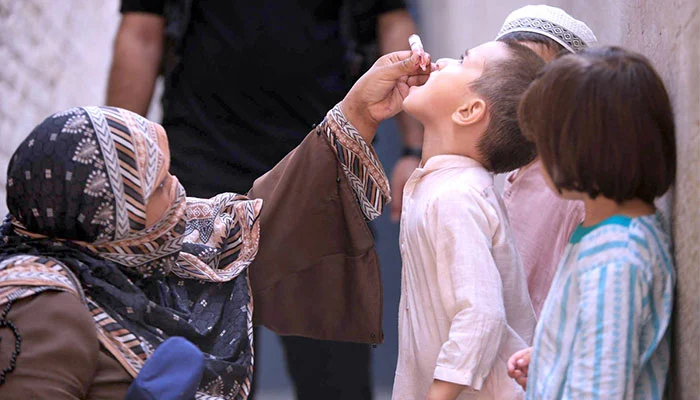ISLAMABAD: Pakistan’s fight against polio has hit a troubling milestone. Four new cases emerged in Balochistan and Khyber Pakhtunkhwa (KP), bringing the total for the year to 37, according to officials from the Polio Eradication Initiative (PEI) on Friday. The latest victims include young children: a 30-month-old girl from Lakki Marwat, an 18-month-old girl from Pishin, a 9-month-old boy from Chaman, and a 5-year-old boy from Noshki.
Despite global efforts to eradicate polio, Pakistan, alongside Afghanistan, remains one of the last countries where wild poliovirus is still active. The ongoing transmission is largely due to widespread vaccine refusals. Misinformation and conspiracy theories fuel these refusals, making eradication efforts increasingly difficult.
Officials expressed alarm over parents’ refusal to vaccinate their children. This reluctance is primarily driven by unfounded propaganda. Rising vaccine hesitancy, especially in regions like Balochistan and KP, critically hampers efforts to eliminate polio. “Parents are denying both polio drops and routine immunizations due to misinformation spread by illiterate individuals and false propaganda on social media,” officials warned, highlighting the severe consequences of such refusals.
Misinformation and Conspiracy Theories
For years, false claims surrounding polio vaccines have undermined elimination efforts. Misinformation often suggests that the polio vaccine causes infertility or is part of a harmful international plot. These unfounded rumors have led many parents to reject vaccines, directly contributing to new cases in high-risk regions. “The rejection of vaccines is directly linked to the emergence of new polio cases in high-risk areas,” a PEI official noted.
The latest cases in Balochistan and KP exemplify the damaging effects of vaccine hesitancy. Despite extensive efforts by health authorities to reach vulnerable populations, misinformation continues to stall progress. Without proper immunization, children face lifelong paralysis or even death from polio.
A Global Health Challenge
Pakistan’s struggle with vaccine refusal is part of a larger global issue. Vaccine hesitancy is a top 10 threat to global health, as classified by the World Health Organization (WHO). During the Covid-19 pandemic, similar resistance emerged, highlighting how myths and conspiracies create significant barriers to public health initiatives.
PEI officials urge parents to consult qualified medical professionals for accurate information. “Vaccines are safe and essential for saving children from diseases like polio. Listening to uneducated individuals and conspiracy theories puts children’s lives in danger,” warned a PEI spokesperson.
To combat misinformation, health officials are preparing awareness campaigns to dispel myths and promote the benefits of vaccination. Genetic sequencing of the latest polio cases is underway, and vaccination efforts continue in high-risk areas. However, health authorities caution that these efforts will face significant challenges until vaccine refusals are addressed.
A Critical Juncture in the Fight Against Polio
Pakistan has long been part of the global effort to eradicate polio. However, the high number of refusals threatens these achievements. With 37 cases reported this year, the country faces a critical juncture in its fight against polio. The spread of conspiracy theories and vaccine refusal puts the lives of countless children at risk. Health authorities and experts are tirelessly working to address this urgent issue.
Follow us on Google News, Instagram, YouTube, Facebook,Whats App, and TikTok for latest updates
